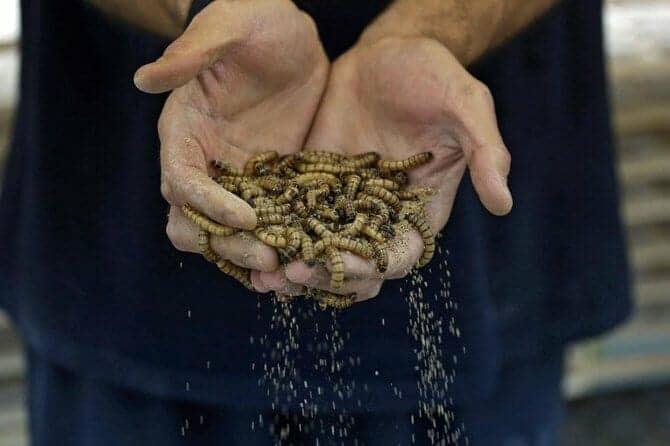-
Breeder Jassem Buabbas is experimenting with recipes before seeking permission from Kuwaiti authorities
-
Some Gulf states have a tradition of eating dried and baked locusts, which can appear in plague proportions
Kuwaiti businessman Jassem Buabbas has spent years breeding “superworms” for animal feed and now hopes the creatures will find their way into the diets of Gulf citizens.
In a small, dark room outside Kuwait City, Buabbas places the worm-like larvae of the darkling beetle, famed for their high protein content, into a transparent box on a bed of bran and cornflour.
In another, he puts the mature beetles for mating.
“My ambition is for worms to be a successful food alternative for humans,” he said.
Insects are widely eaten around the globe, with an estimated 1,000 species appearing on the dinner plates of some two billion people in Africa, Asia and Latin America.
But apart from traditional diets, cricket pasta and mealworm smoothies have become the latest food trend in some world capitals, with edible insects being promoted as a sustainable alternative to regular protein sources.
Some Gulf states have a tradition of eating dried and baked locusts, which can appear in plague proportions. They are considered a delicacy by some, although consumption has fallen out of favor in modern times.
While super worms — in high demand among owners of birds, fish, amphibians and reptiles — have not yet been approved for human consumption in Kuwait, Buabbas is hopeful that people will be willing to try them.
He aims to expand his business beyond the pet trade and get the invertebrates onto dinner plates, in what would be the first such restaurant in the Gulf.
He is now experimenting with recipes before seeking permission from the Kuwaiti authorities.
“I have so far created three types of sauces… and colleagues of mine have tried and liked them,” said Buabbas, who apart from breeding superworms works in the government sector.
Regulation is catching up with the food trend — in May, the European Commission approved dried mealworms for human consumption after the 27-nation bloc’s food watchdog said they were safe to eat.
The decision was good news for the burgeoning insect farming industry in Europe.
Buabbas said a fascination with the secrets of superworms prompted him to travel to Thailand in 2018 to learn more about the animals which are popular snacks there.
“At first, I was disgusted by them, but… then I got used to the worms, understanding their behavior and what poses a danger to them,” he said.
He spends two hours with the creatures every day, feeding them oats, bran, potatoes and carrots, as well as tweaking humidity and temperature levels.
He usually produces between 3,000 and 6,000 worms every three months, and at times up to 10,000.
The superworms take about 90 days to mature enough to be ready for sale — each weighing approximately a gram at six centimeters (two inches) long. They fetch $3 for 25 larvae.
Buabbas said the superworm business has been lucrative, with bird-breeder customers buying thousands of dollars worth at a time to feed their cardinals and nightingales.
Before borders closed due to the coronavirus pandemic, he would transport boxes of worms to other Gulf countries, especially Saudi Arabia.
Buabbas markets his business on social media, while he works on superworm recipes that he says will incorporate elements of local cuisine.
But when asked how they tasted, he said he didn’t know. He’s never tried them.








